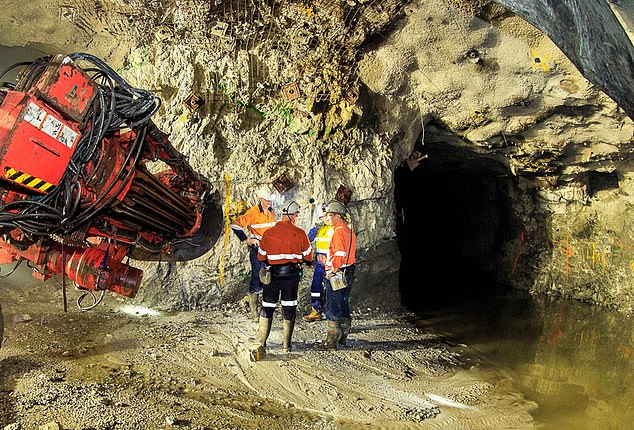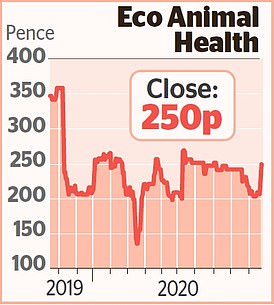MARKET REPORT: London-listed Gold miners Fresnillo and Centamin hit by production troubles and rising costs
Shares in two of London’s biggest gold miners were tarnished by warnings they will dig up less of the precious metal than planned.
Mid-capper Centamin tumbled after admitting production will fall short of expectations and costs will jump, this year and next.
Work at its flagship Sukari mine in Egypt has been disrupted by ground disturbance at the sites, which is potentially a huge safety risk.

Work at Centamin’s flagship Sukari mine in Egypt (pictured) has been disrupted by ground disturbance at the sites, which is potentially a huge safety risk
But the issues are unfortunately timed as gold prices have soared this year amid the Covid crisis – and would mean it could get a handsome return for production at full whack.
Centamin shares nosedived 19.2 per cent, or 31.2p, to 131.3p, wiping out virtually all of the gains it has made since the start of the year.
FTSE 100-listed gold and silver miner Fresnillo also disappointed, saying the pandemic had impeded work at its sites in Mexico and its full-year production will be 40,000 ounces lower than previously guided. It fell by a less extreme 4.4 per cent, or 58p, to 1275p.
FTSE 250-listed Hochschild Mining also dropped, falling 2.3 per cent, or 5.8p, to 243.4p, despite committing to its existing forecasts.
Challenger lender Metro Bank reported a 10 per cent rise in deposits in the third quarter of 2020, compared to the same time last year, at £15.6billion.
The firm rose 2.5 per cent, or 1.48p, to 60.98p after it also said it had boosted its loan book by 1 per cent to £15.1billion – mostly by handing out more than £1.3billion in government-backed Covid support loans.
But the company, which is still recovering from an accounting disaster last year, said it is still struggling to hit regulatory requirements on how much cash it should hold.
The pound lifted to a one-week high, trading above $1.31, after the EU’s chief negotiator Michel Barnier said a Brexit deal was ‘within reach’.
This held back the FTSE 100, as a stronger pound weighs on the dollar-denominated earnings of overseas multinational companies listed on the index.
The Footsie slid 1.9 per cent, or 112.72 points, to 5776.5, while the FTSE 250 fell by 0.8 per cent, or 141.38 points, to 17787.82.
British Airways-owner IAG was burned by a broker note from Goodbody, despite being upgraded from ‘hold’ to ‘buy’.
Although analysts said it was time to ‘focus on the recovery into next year’, they cut the target price on its stock from 225p apiece to 130p, sending the company’s shares fell 6 per cent, or 6.4p, to 100.45p by the close.
Superdry, however, was given a leg up by a note from Peel Hunt. Analysts upgraded the Japan-inspired clothing chain from ‘hold’ to ‘add’ and bumped its target price up from 175p to 200p after being impressed by its latest collection.
Peel Hunt said the new garb was a ‘significant step-up in what has come before’ and ‘moved the collection on’. Shares rose 7.5 per cent, or 11.1p, to 160p.
Fellow retailer Boohoo also rallied. The scandal-hit group climbed 4.7 per cent, or 11.7p, to 261.8p, after three directors scooped up more than £750,000 of stock in a bid to bolster its share price.
The share purchases were revealed on Tuesday after the market closed – meaning yesterday was the first time traders could digest them.
Investors met the news that warehouse group Segro has bought a £133million logistics park in east London with a tepid reception. It fell 0.9 per cent, or 8.6p, to 929.2p after announcing the Canning Town deal with Schroders.
The Ugandan government’s decision to allow Tullow Oil to sell a stake in an oil project on the country’s Lake Albert to French oil major Total for £438million put a rocket under beleaguered energy group.
Tullow’s shares rose by as much as 40 per cent in early trading before closing up 24.3 per cent, or 4.01p, to 20.52p.

